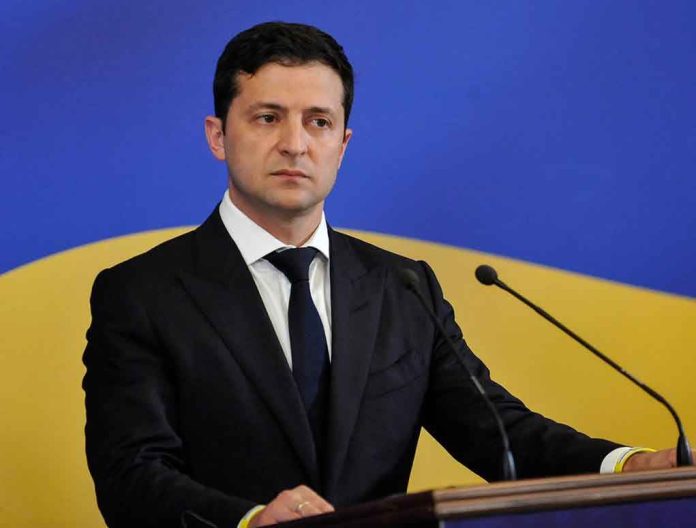
Ukraine’s battlefield just got a whole lot more crowded—and complicated—as reports confirm two Chinese nationals have been captured in the midst of Kyiv’s audacious cross-border operations inside Russia’s Kursk region, raising fresh questions about foreign interference, global escalation, and the utter absurdity of today’s blurred red lines.
At a Glance
- Ukraine has seized two Chinese citizens suspected of spying or fighting in the Kursk region.
- Kyiv’s forces actively hold territory and conduct raids inside Russian borders, marking a historic escalation in the war.
- Russian and Ukrainian authorities are clashing over territorial control, with civilians and infrastructure caught in the crossfire.
- The involvement of foreign nationals adds another layer of tension and uncertainty to an already volatile conflict.
Foreign Intrigue and a New Frontline: Kursk’s Chaotic Chessboard
Welcome to the Kursk region—where the laws of common sense have evidently gone on indefinite leave. In what can only be described as a geopolitical circus, Ukraine’s military is not just defending its homeland but has now launched direct, boots-on-the-ground offensives inside Russian territory. This is not some spy novel fantasy; Ukrainian forces seized up to 1,400 square kilometers in Kursk at the peak of their 2024 campaign, with fighting grinding on through the spring and summer of 2025. These operations are designed to disrupt Russian supply lines, force Moscow to stretch its already overextended military, and—let’s be honest—send a message that Ukraine can hit back, and hard. Meanwhile, Russian authorities scramble to maintain the illusion of order, imposing so-called “counter-terrorism regimes” that let the FSB seize cars, block roads, and snoop on communications. All this, of course, while ordinary Russian civilians in Kursk get to experience the joys of power blackouts, roadblocks, and the ever-present fear that the next drone strike will land on their street.
This is not some minor border skirmish. It’s a full-blown escalation, with Ukrainian forces holding around 90 square kilometers as of late June 2025, despite relentless Russian counterattacks. Ukrainian Commander-in-Chief Oleksandr Syrskyi insists that holding Kursk is critical for deterrence, while Russian elites like the 810th Separate Naval Infantry Brigade and the 11th Airborne Division are being thrown at the problem, hoping to reverse Ukraine’s gains. The result? A daily grind of skirmishes, sabotage, and the kind of chaos that makes you wonder if anyone in Moscow or Kyiv even remembers what stability looks like anymore.
Chinese Nationals in the Crosshairs: Global Shenanigans Go Local
Just when you think this conflict couldn’t get any more convoluted—enter two Chinese citizens, reportedly nabbed by Ukrainian forces on suspicion of espionage or directly participating in the fighting. That’s right, not only is Russia’s backyard now a warzone, but the world’s most populous nation seems to have skin in the game, too. Details remain murky, as both Ukraine and Russia trade accusations about who’s really running the show—and what these Chinese nationals were doing so close to the front lines. Are we witnessing a new era of proxy warfare, or is this just another symptom of the global free-for-all that’s been unleashed by years of failed deterrence and international handwringing?
This incident is more than just a headline; it’s a flashing neon sign that the conflict in Ukraine is drawing in ever more players, all while Western leaders dither about “escalation risks” and diplomatic niceties. The presence of foreign nationals as combatants or spies is a dangerous precedent, one that makes the world’s current crop of leaders look either dangerously naïve or willfully blind to the consequences of their own weak policies. If you’re not at least a little concerned about what comes next, you haven’t been paying attention.
Chaos on the Ground: Civilians Pay the Price While Elites Play War Games
The people who suffer most from this elite game of Risk aren’t the generals and politicians—no, it’s the civilians of Kursk and the borderlands, tossed into a nightmare of martial law, economic disruption, and constant fear. Power substations have become favorite targets for drone strikes, causing rolling blackouts that leave families huddled in the dark. Movement restrictions and random vehicle seizures are the new normal, courtesy of broad “anti-terror” powers handed to Russian security forces. Meanwhile, in Ukraine’s own border regions, residents brace for inevitable retaliation, as Russia answers every Ukrainian advance with more missile strikes and collective punishment.
All of this is unfolding while the so-called international community wrings its hands and issues the usual bland statements about “concern” and “restraint.” Here’s a thought: maybe if Western leaders spent less time subsidizing chaos abroad and more time securing their own borders and protecting their own citizens, the world wouldn’t be watching a slow-motion train wreck in Eastern Europe. But that would require sanity, accountability, and—heaven forbid—an actual commitment to putting the interests of ordinary people ahead of globalist gamesmanship.





